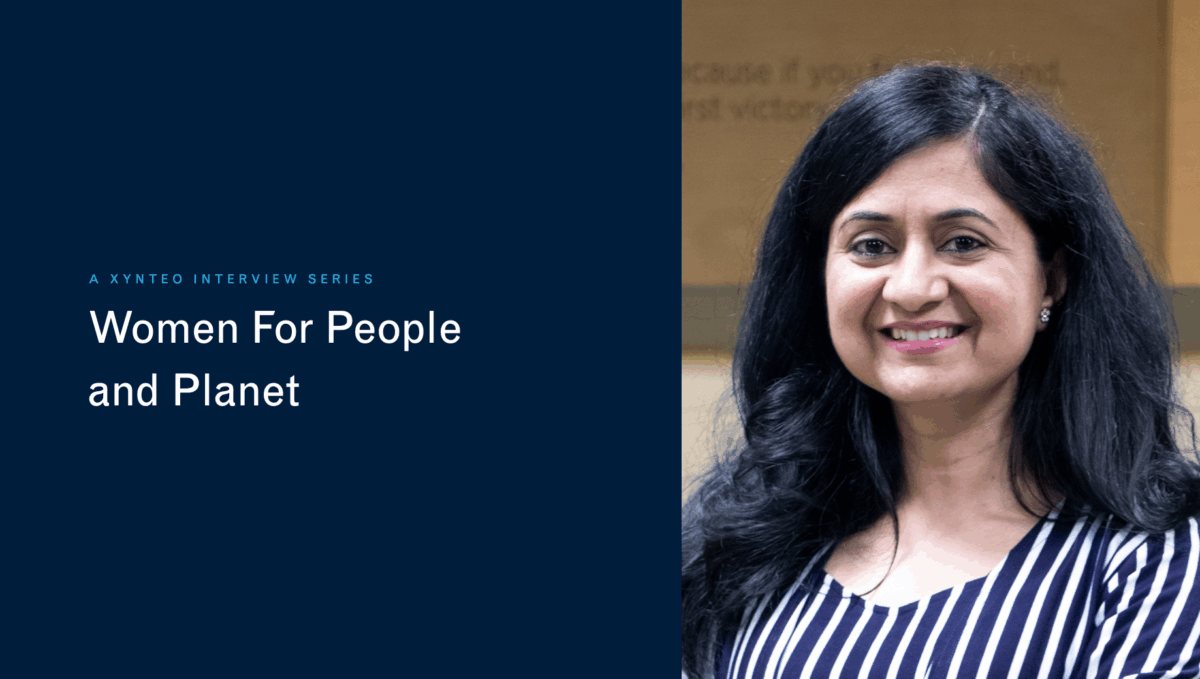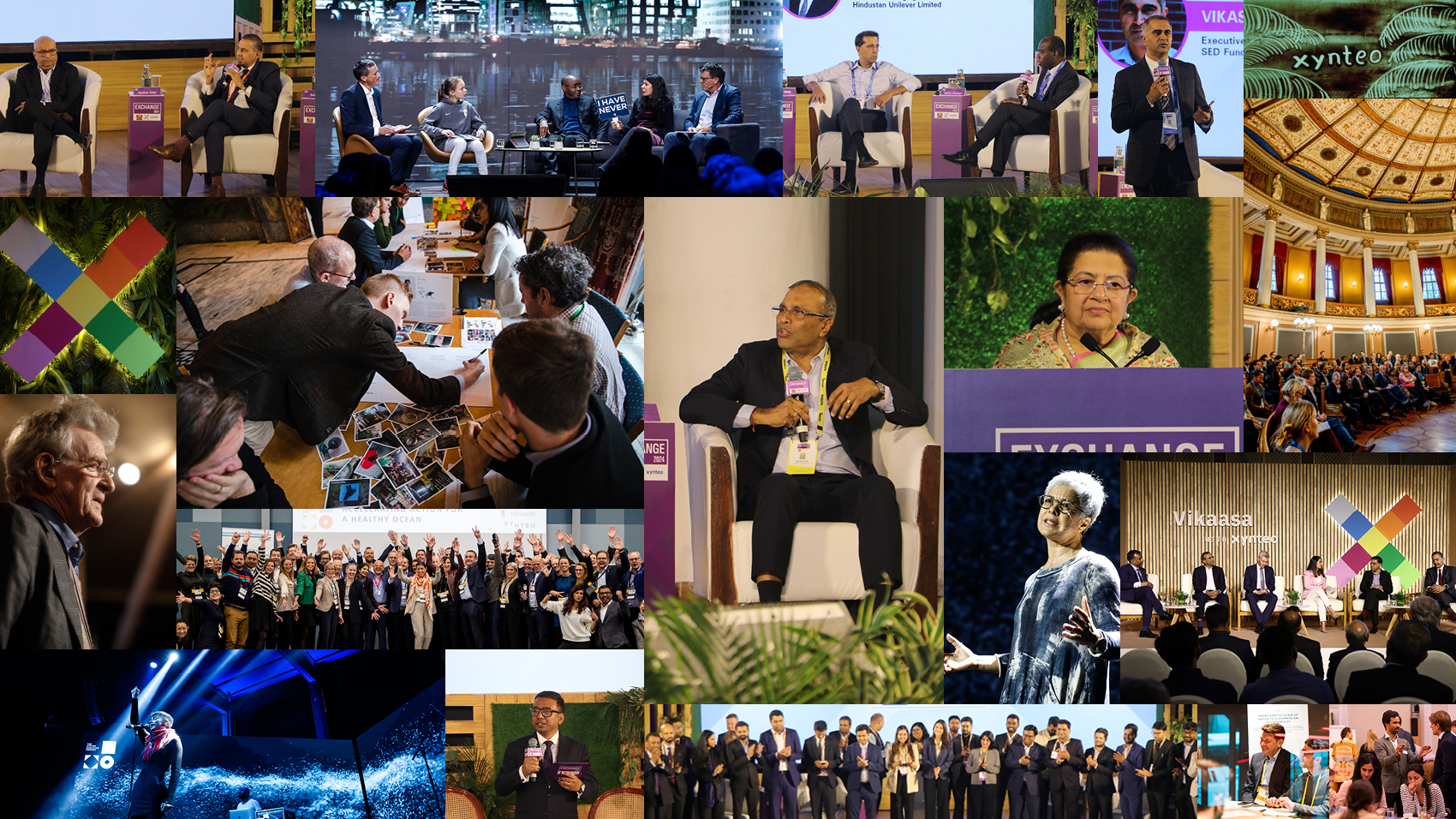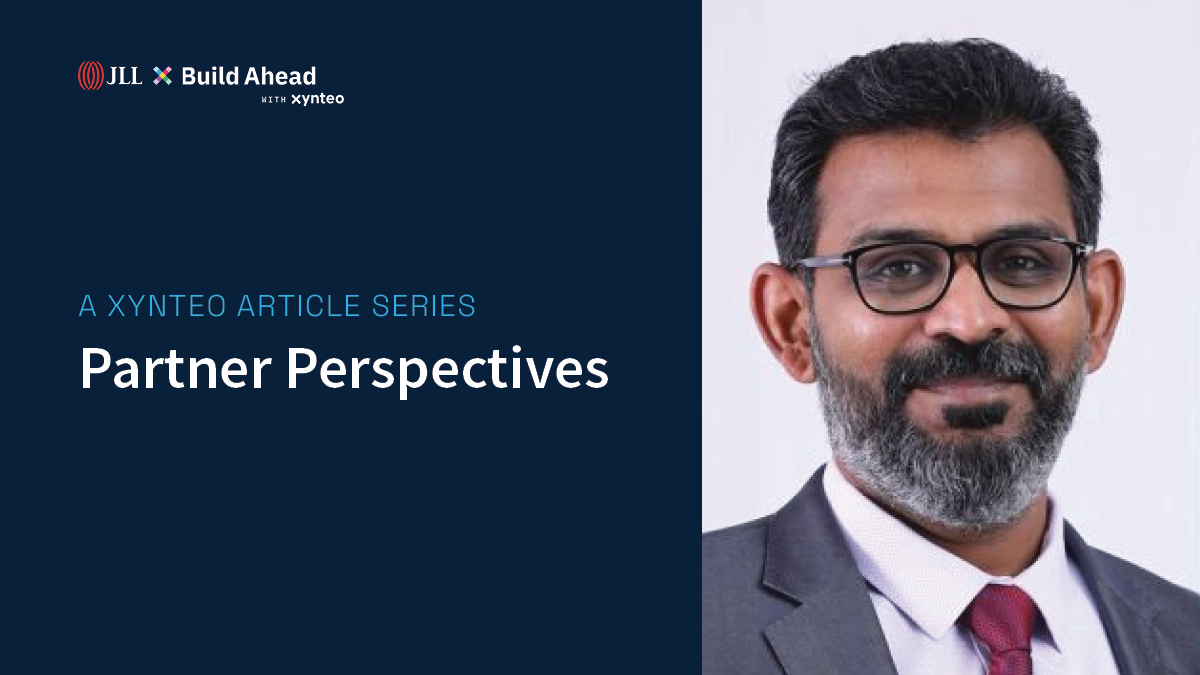Meet Rashmi Pimpale, who is tackling sustainability’s toughest challenges with a blend of strategic vision and hands-on action. She’s passionate about empowering local innovators and driving tangible change on the ground. From farm fields to boardrooms, she’s working to empower start-ups, shape policy, and build powerful networks to drive change.
Xynteo’s Pragya Ojha sat down with Rashmi to talk about her journey, what she has learned, and how she sees the future of sustainability in the corporate world.
What does your personal journey towards sustainability look like?
Rashmi: My sustainability journey, or commitment to sustainability, stems from the strong belief that when we harness technology and innovation effectively, they have the potential to transform industries and balance environmental priorities and economic progress. From Research and Innovative Circle of Hyderabad (RICH)’s perspective, our journey aligns with global efforts to combat climate change and resource depletion. Our focus has always been on creating locally relevant solutions with measurable impact, even as we align our goals with global efforts.
We are looking at the extreme urgency to address climate change, depleting natural resources, and environmental concerns. This has led to a strong push towards sustainability-driven policies and business models. However, from a holistic perspective, the real challenge lies in translating these large-scale commitments into something practical and actionable at the local level.
That is where we play a key role. We identify promising innovation, support start-ups, and facilitate collaborations between diverse stakeholders such as industry, institutions, innovators, and government through key projects. We are bridging the gap between global goals and local action and making sure that the solutions created are implementable and helpful to the local area.
What are the skills and experiences that you’ve valued the most on this journey and have equipped you best?
Rashmi: Throughout my journey, especially with RICH, the most valuable experience has been working on high-impact projects—like greening MSMEs and creating the green hydrogen ecosystem in Telangana and working with start-ups and innovators to translate their ideas into scalable solutions. We know innovations in sustainability often face multiple barriers—technical, financial, regulatory. Just the ability to provide strategic support for project implementation, or guidance to start-ups, has been instrumental in overcoming these challenges.
Another key learning is the importance of long-term thinking. Sustainability efforts require a lot of patience. The results aren’t immediate. So, the ability to balance short-term commercial gains with long-term environmental or societal impact is something I have learned through my work.
I would also like to add that sustainability efforts require systems-level thinking. Linear-level thinking takes a sequential cause-and-effect approach. But systems-level thinking looks at the interconnectedness of complex elements, taking a holistic approach.
Before joining RICH, I held specialised roles in the pharmaceutical sector—initially in R&D and later in intellectual property management. In contrast, RICH offered a much broader mandate. What made this role particularly meaningful was the autonomy we had to work on the state priorities and align them with national missions. This level of strategic freedom allowed us to take a more holistic approach and drive impactful interventions across multiple sectors.
What opportunities have been the most important to making progress in your sustainability journey?
Rashmi: Government support has been a major enabler in advancing our initiatives in Sustainability We are actively working with government bodies to align our initiatives with both national and state-level sustainability goals. We have been giving policy inputs to the state government, and the policies that come up in our verticals and focus sectors.
Another key opportunity has been the rise in industry’s interest in sustainability. Large organisations are embracing ESG principles or at least looking at integrating them into their strategies. This has opened doors for start-ups to partner with established players. We have facilitated several such partnerships, ensuring that stakeholders, specifically start-ups, receive the right mentorship and market access.
At RICH, through the Startup India Seed Fund Scheme, we have supported start-ups such as Rangbio Solutions, Eco-Orbit and Liqsure which are doing well in their respective sectors. RangBio offers a unique palette of sustainable and non-polluting bio-colours derived from microbes. Their innovative approach contributes to reducing environmental harm while promoting sustainability in manufacturing processes. LiqSure revolutionizes municipal wastewater and industrial effluent treatment through a modular, compact, quick and zero chemical-based treatment solution which can work alongside conventional effluent treatment solutions thereby improving the overall coverage, efficacy and sustainability of the effluent management sector.
Guiding start-ups, mentoring them, having the opportunity to interact with diverse stakeholders with crucial support from the government—I think that has been a major enabler for me and for RICH.
Businesses, going forward, will have to balance profitability with sustainability. This shift requires ecosystem-driven solutions, rather than isolated interventions.
What barriers have you faced and how have you overcome them?
Rashmi: One of the biggest challenges in the sustainability sector is funding. Unlike some sectors, projects and start-ups in the Sustainability sector often require longer gestation periods and significant upfront investments. Many early-stage start-ups struggle to secure funding because their solutions may not have immediate commercial viability.
Another challenge is scaling these solutions beyond pilot projects. While many start-ups develop promising innovations, transitioning from small-scale pilots to full-scale deployment requires significant capital, regulatory approvals, and market adoption.
So, we are looking at facilitating or addressing these challenges through the network we have developed over the years. It could be access to funds, CSR, schemes, or even philanthropy or government ministry funding.
What has been your proudest achievement?
Rashmi: Two initiatives stand out as defining moments in my work and RICH’s sustainability journey—kick-starting the green transition of MSMEs in Telangana and establishing the green hydrogen ecosystem.
MSMEs are extremely important for the state’s economy, but there is often limited awareness or outreach to them. One of our projects—to help them move towards adopting greener technologies—was launched at a very opportune time, when the Telangana state government launched the MSME policy and Clean and Green Energy policy. We’ve been instrumental in giving our inputs to these policies, and they are going to be extremely useful in supporting MSMEs in their transition towards sustainable resources. They don’t have the bandwidth or wherewithal of a big company to adopt greener technologies, though they intend to. Through this project, by providing initiatives, incentives, and frameworks, our role is to encourage MSMEs to adopt greener technologies. I think that is going to create a more inclusive and scalable approach to long-term sustainability. MSMEs, like I said, are the backbone of all kinds of industries. We’re looking at different clusters of MSMEs in different sectors and looking forward to implementing the central and state governments’ scheme, RAMP—Raising and Accelerating MSME Performance.
The second one is, of course, the establishment of the green hydrogen ecosystem, which represents a pioneering step towards green energy adoption in Telangana. As you know, hydrogen is emerging as a key component in the global energy transition. There is a lot of interest, nationally and internationally, in exploring green hydrogen as the next clean energy. This initiative has helped position RICH to be at the forefront of green energy innovation in the state. For this, we have brought together industry leaders, policymakers, researchers, and start-ups. This consortium, we strongly believe, has the potential to transform Telangana’s entire energy landscape.
Both these initiatives are close to our heart because they reflect RICH’s core philosophy of leveraging innovation, collaboration, and policy to drive large-scale impact. Also, because it is a very difficult task—each entity has its own priorities, mandates, and timelines. Bringing them all together and asking them to work towards a common goal is a herculean task. And we are happy that we have been able to do that.
How do you see the future of the CSO role/sustainability teams in the board room?
Rashmi: In my opinion, businesses, going forward, will have to balance profitability with sustainability. This shift requires ecosystem-driven solutions, rather than isolated interventions. We have seen firsthand how sustainability initiatives succeed when they integrate policy support, industry collaboration, and innovation networks. A similar approach is being adopted by corporations, where CSOs are playing a pivotal role in guiding long-term sustainability strategies. They’re also trying to de-risk investments in emerging technologies and ensuring regulatory alignments. So, I think that’s a very powerful and impactful role that is being played right now.
Just take the example of green hydrogen. Industries are keen to explore, but hesitant because the technology is evolving, and costs are very high. Therefore, the model for businesses and industries to follow should be a shared risk, shared reward model. That enables multiple players to explore opportunities and mitigate risks collectively.
This kind of collective, collaborative, systems-thinking approach, I think, will define the role of CSOs in shaping the sustainability agenda. Ultimately, sustainability teams will no longer be a separate function—they will have to work closely, or be embedded deeply, in business strategy, investment planning, and risk mitigation. That is how long-term growth and real impact will follow.
Are there any women role models that have inspired you?
Rashmi: Beyond the well-known figures, there are countless unsung heroes such as the women farmers working in their fields, leading grassroots movements, and innovating in their own ways to drive sustainability forward. Their contributions, though often unnoticed, are crucial in shaping a more resilient and sustainable future. In 2022, in collaboration with the UNDP, RICH worked on identifying and documenting 25 climate resilient agriculture practices across the Dryland, Gardenland and Wetland farming ecosystem across Telangana.
One such example is Samamma from Bidekanne village, Zaheerabad mandal. She has been practicing traditional farming for over three decades and has taken significant steps to conserve native crop varieties. Through innovative community-based seed storage systems, she has helped safeguard indigenous seeds, ensuring farmers have access to resilient, locally adapted crops even in times of climate stress. Her efforts not only promote biodiversity but also reduce farmers’ dependence on commercial seed companies, making agriculture more self-reliant and sustainable.
Another inspiring example is Durgamma, who has pioneered dry leaf mulching as a way to protect crops from erratic weather patterns. Her technique of using organic mulch helps retain soil moisture, prevents erosion, and improves soil fertility demonstrating how simple, nature-based solutions can be powerful tools for climate resilience.
I think it is important to highlight such figures because most of the time role models seem very far-fetched. For example, women in science or tech, like Sunita Williams or Kalpana Chawla, are great role models. But some little girl from a remote location in India may feel very intimidated to even dream of something these women have achieved. So, it is important that we have local role models whom we can relate to, where if a little girl sees them, she should be able to say, if she can do it, so can I. And that is likely to inspire them more than looking at larger-than-life role models.
Do you have any advice for women starting out in careers around sustainability?
Rashmi: Sustainability is one of the most dynamic, impactful, and rewarding fields today. It offers a lot of opportunities to drive real change across industry. It is industry-agnostic, sector-agnostic.
My advice to women entering the space would be to embrace an interdisciplinary mindset. Because this field intersects policy, technology, economics, social impact, and innovation. So, developing expertise across these areas—whether it be corporate sustainability, research, entrepreneurship, or even policymaking, for that matter, would lead to great opportunities.
Another aspect I would like to highlight is building strong networks. Sustainability is not a solo effort. It thrives on collaboration. It flourishes on partnerships. Engaging with research institutions, industry leaders, innovators, NGOs, and policymakers can help women find the right opportunities as well as mentors who can guide their journey.
To be inspired by all our latest interviews, visit our Women for People and Planet interview hub.
Read moreStay up to date with our latest interviews by following us on social media (LinkedIn I Twitter), or Contact Us to find out how we can help your leaders and organisation create people and planet-positive impact.



